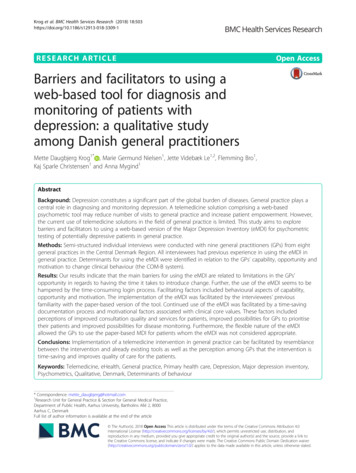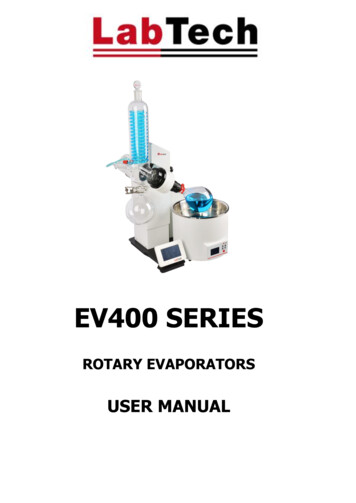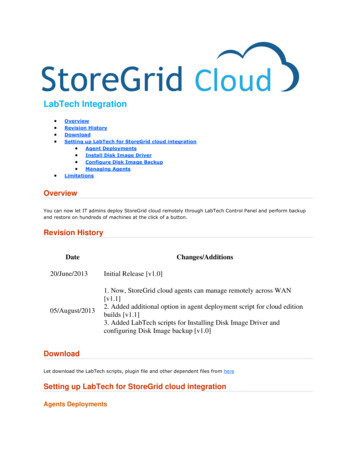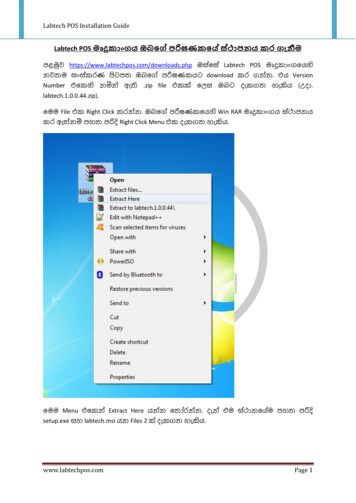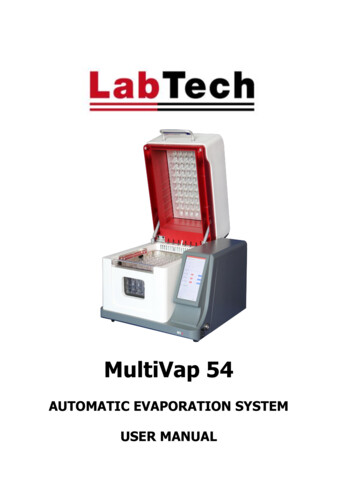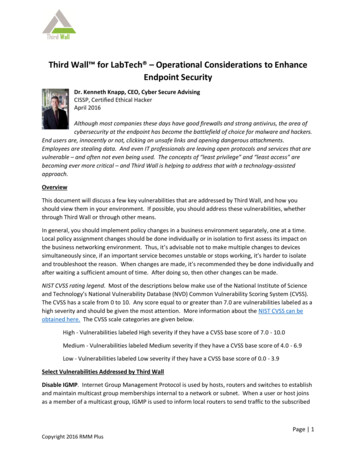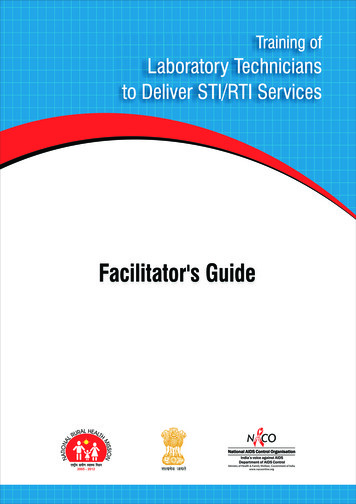
Transcription
TR A INING OFL A B O RAT O RYT E C H N I C I AN STO DELIVERS T I / RT I S E RV I C E SFACILITATOR' SG U IDEMAY 2011
Sayan ChatterjeeSecretary & Director GeneralDepartment of AIDS Control, NACO, Ministry of Health and Family Welfare, Government of IndiaMESSAGEThe prevention, control and management of STI/RTI is a well recognized cost effectivestrategy for controlling the spread of HIV/AIDS in the country as well as to reducereproductive morbidity among sexually active population. Individuals with STI/RTI havea significantly higher chance of acquiring and transmitting HIV. Moreover STI/RTI arealso known ti cause use infertility and reproductive morbidity. Controlling STI/RTI helpsdecrease HIV infection rates and provides a window of opportunity for counselling aboutHIV prevention and reproductive health.An operational framework for convergence between National AIDS Control ProgrammePhase III and Reproductive and Child health Programme Phase II under National RuralHealth Mission has been developed. This will bring about uniformity in implementationos STI/RTI prevention and control through the public health are delivery system Throughthis, the availability and reach of standardized STI/RTI care at all levels of healthfacilities will be ensured.The NACP III Strategy and Implementation Plan (2007-2012) makes a strong reference toexpanding access to a package of STI management services both in the general populationas well as for high risk behavior groups.For nation-wide training of health functionaries on STI/RTI management standardizedtraining modules and training aids/job-aids for various functionaries involved in provisionof STI/RTI care have been developed to train doctors ANMs/Nurses, and to technicians onSyndromic Case Management of STI/RTI.I am sure that these comprehensive operational guidelines will help towards ensuring theprovision of quality STI/RTI services across the country.(Sayan Chatterjee)6th Floor, Chandralok Building, 36 Janpath, New Delhi-110001, Phone: 011-23325331, Fax: 011-23731746E-mail: nacoasdg@gmail.comKnow Your HIV status, go to the nearest Government Hospital for free Voluntary Counselling and Testing(iii)
Government of IndiaMinistry of Health & Family WelfareNirman Bhavan, New Delhi-110108P.K. PRADHAN, I.A.S.Additional Secretary &Mission Director (NRHM)Tele: 23061451 Fax: 23061975E-mail: md-nrhm@nic.inPREFACESexually transmitted infections and reproductive tract infections (STIs/RTIs) are importantpublic health problems in India. Studies suggest that 6% of the adult population in India isinfected with one or more STIs/RTIs. Individuals with STIs/RTIs have a significantly higherchance of acquiring and transmitting HIV. Moreover, STIs/RTIs are also known to causeinfertility and reproductive morbidity. Controlling STI/RTIs helps decrease HIV infectionrates and provides a window of opportunity for counseling about HIV prevention andreproductive health.The implementation framework of National Rural Health Mission (NRHM) provided thedirections for synergizing the strategies for prevention, control and management forSTI/RTI services under Phase II of Reproductive and Child Health Programme (RCH II)and Phase III of National AIDS Control Programme (NACP III). While the RCH programmeadvocates a strong reference "to include STI/RTI and HIV/AIDS preventions, screeningand management in maternal and child health services", the NACP includes services formanagement of STIs as a major programme strategy for prevention of HIV.These modules are intended as a resource document for the programme managers andservice providers in RCH II and NACP III and would enable the RCH service providersand NACO service provider in organizing effective case management services for STI/RTIthrough the public health care system.(P.K. Pradhan)(v)
Aradhana Johri, IASAdditional SecerataryDepartment of AIDS Control, NACO, Ministry of Health and Family Welfare, Government of IndiaFOREWORDCommunity based surveys have shown that about 6% of adult Indian population suffers fromsexually transmitted infections and reproductive tract infections. The prevalence of theseinfections is considerably higher among high risk groups ranging from 20-30%. Consideringthat the HIV epidemic in India is still largely concentrated in the core groups, prevention andcontrol of sexually transmitted infections can be an effective intervention to reverse the HIVepidemic progress.Syndromic Case Management (SCM) is the cornerstone of STI/RTI management, being acomprehensive approach for STI/RTI control endorsed by the World Health Organization(WHO). This approach classifies STI/RTI into syndromes, which are easily identifiable groupof symptoms and signs and provides treatment for the most common organisms causing thesyndrome. Treatment has been standardized through the use of pre-packaged colour codedSTI/RTI drug kits. SCM achieves high cure rates because it provides immediate treatmenton the first visit at little or no laboratory cost. However, it goes hand in hand with otherimportant components like counseling, partner treatment, condom promotion and referralfor HIV testing.As per the convergence framework of NACO-NRHM for STI/RTI service delivery, uniformservice delivery protocols, operational guidelines, training packages & resources, jointlydeveloped by NRHM & NACO are to be followed for provision of STI/RTI services at all publichealth facilities including CHC and PHC. As per joint implementation plan, NACO/SACSwould provide training, quality supervision and monitoring of STI/RTI services at all healthfacilities, thus overseeing the implementation. For tracking access, quality, progress andbottlenecks in STI/RTI program implementation, common information and monitoring systemjointly developed by NACO and NRHM would be followed.As a step to take convergence forward, it is envisaged that a resource pool of trainers iscreated at state and district level so as to enable roll out trainings for service providersin the public health care delivery system using the jointly developed training material andthrough the cascade models of trainings. The ultimate aim is to ensure high quality STI/RTIservice delivery at all facilities with best utilization of resources available with both NACPIII and RCH II/NRHM.(Aradhana Johri)6th Floor, Chandralok Building, 36 Janpath, New Delhi-110001, Phone: 011-23325343, Fax: 011-23731746E-mail: aradhana.johri@nic.inKnow Your HIV status, go to the nearest Government Hospital for free Voluntary Counselling and Testing(vii)
Government of IndiaMinistry of Health & Family WelfareDepartment of AIDS ControlNational AIDS Control OrganisationDr. Sunil D. KhapardeDeputy Director GeneralTel: 91-11-23736851Fax: 91-11-23731746E-mail: sdkhaparde.naco@gmail.com9th Floor, Chandralok Building,36 Janpath, New Delhi-110 001ACKNOWLEDGMENTReproductive tract infections (RTIs) including sexually transmitted infections (STIs) present a hugeburden of disease and adversely impacts the reproductive health of people. The emergence ofHIV and identification of STIs as a co-factor have further lent a sense of urgency for formulating aprogrammatic response to address this important public health problem.The comprehensive training modules on the Prevention and Management of STI/RTI have come throughwith the coordinated and concerted efforts of various organizations, individuals and professionalbodies, who have put in months of devoted inputs towards it.The vision and constant encouragement of Ms K Sujatha Rao, IAS, Secretary Health and Familywelfare, Shri K Chandramouli, IAS, Secretary and Director General NACO, Ms Aradhana Johri, IAS,Additional Secretary NACO and Shri Amit Mohan Prasad, IAS, Joint Secretary RCH, Ministry of Healthand Family Welfare is sincerely acknowledged, under whose able leadership these modules have beendeveloped.The technical content has been jointly developed by STI division, Department of AIDS Control(National AIDS Control Organization) and Maternal Health Division of MoHFW. The National Institutefor Research in Reproductive Health (NIRRH), Mumbai under ICMR initiated and lead the processof reviewing the existing training material and developing updated training modules through theorganization of a number of meetings and workshops. The preparation and design of material alsoinvolved the technical assistance, funding support and other related support provided by WHO,UNFPA, FHI and many other experts in the field.Thanks are due to Dr. Anjana Saxena, Deputy Commissioner, Maternal Health Division, Dr. HimanshuBhushan, Dr. Manisha Malhotra, and Dr. Dinesh Baswal, Assistant Commissioners Maternal HealthDivision for their constant technical inputs, unstinted support and guidance throughout the processof developing these guidelines. The hard work and contributions of Dr. Ajay Khera, then AssistantDirector-General, and NACO STI team comprising of Dr. Shobini Rajan, Deputy Director, Dr. BhriguKapuria, Technical Officer, Dr. TLN Prasad, and Dr. Aman Kumar Singh, Technical Experts andDr. Naveen Chharang, Assistant Director at NACO have been invaluable in shaping the document.Sincere appreciation is due to Dr. Sanjay Chauhan, Deputy Director, NIRRH who coordinated thewhole process along with his team comprising Dr. Ragini Kulkarni, Research Officer and Dr. BeenaJoshi, Senior Research Officer at NIRRH. Special mention is made of contribution of Dr. Deoki Nandan,Director, NIHFW, Delhi and for all those who coordinated the piloting of the module through StateHealth Directorates and State AIDS Control Societies of Uttar Pradesh, Madhya Pradesh, Assam,Kerala, West Bengal and Gujarat. I also thank to Public Health Foundation of India (PHFI) for providingassistance to print these modules.(Dr. Sunil D. Khaparde)(ix)
LIST OF ACRONYMSAIDSANCARTANMsAcquired Immunodeficiency SyndromeAnte Natal CareAnti Retroviral TherapyAuxiliary Nurse MidwivesBVBacterial VaginosisCACHCsCMVCDCCandidiasis, yeast infectionCommunity Health CentresCyto MegaloVirusCentre for Disease ControlDNADeoxy Ribonucleic AcidECESREIAELISAEndoEmergency ContraceptionErythrocyte Sedimentation RateEnzyme Immuno AssayEnzyme Linked Immuno Sorbent AssayEndogenousFPFHIFTA-AbsFamily PlanningFamily Health InternationalFluorescent Treponema Antibody Absorption TestGUDGenital Ulcer DiseaseHBVHIVHPVHSVHepatitis B VirusHuman Immunodeficiency VirusHuman Papilloma VirusHerpes Simplex VirusIatroIPHSICTCIDUsIMIUIUDIVIatrogenicIndian Public Health StandardsIntegrated Counselling and Testing CentreIntravenous Drug UsersIntramuscularInternational UnitsIntra Uterine DeviceIntravenousKOHPotassium HydroxideLCRLGVLigase Chain ReactionLympho Granuloma Venereum(xi)
LHVMOHFWMSMsMCHMHA-TPMTCTMVALady Health VisitorMinistry of Health and Family WelfareMen having Sex with MenMaternal and Child HealthMicro Haemagglutination Assay forantibodies to Treponema PallidumMother-To-Child TransmissionManual Vacuum AspirationNACPNRHMNPCP-IIINIRRHNACONGONGUNational AIDS Control ProgramNational Rural Health MissionNational AIDS Control Program-Phase IIINational Institute for Research in Reproductive HealthNational AIDS Control OrganizationNon Governmental OrganizationNon Gonococcal UrethritisPHCPLHAsPAP TestPPTCTPSIPCRPEPPIDPrimary Health CentrePersons Living with HIV/AIDSPapanicolaou TestPrevention of Parent-To-Child Transmission of HIVPopulation Services InternationalPolymerase Chain ReactionPost Exposure ProphylaxisPelvic Inflammatory DiseaseROMRPRRTIRCHRCH-IIRupture of MembraneRapid Plasma ReaginReproductive Tract Infection(s)Reproductive and Child Health ProgramReproductive and Child Health Program-Phase IISTISTDSACSSexually Transmitted InfectionSexually Transmitted DiseaseState AIDS Control SocietyTPHATITVTreponema Pallidum Haemagglutination TestTargetted InterventionTrichomonas VaginalisUTIUNFPAUrinary Tract InfectionUnited Nations Population FundsVCTVDRLVoluntary Counseling and TestingVenereal Disease Research LaboratoryWBCWHOWhite Blood CellsWorld Health Organization(xii)
ContentsModuleNo.1TopicPageNo.1Introductory moduleSession 1: Getting to know each otherSession 2: Programme objectives and scheduleSession 3: Pre-test2Understanding common STI/RTI19Session 1: Module IntroductionSession 2: What are STI/RTI and routes for transmissionSession 3: Common STI/RTI and causative organismsSession 4: Complications of STI/RTI3Laboratory tests for STI/RTI35Session 1: Module IntroductionSession 2: Role of the laboratory in STI/RTI controlSession 2: Laboratory tests for STI/RTI4Disinfection and Standard Precautions53Session 1: Module IntroductionSession 2: Standard precautions for prevention of STI/RTISession 3: Disinfection of instruments and cleaning ofhealth careAnnexuresI References and Source63II Core Group Members64III List of Contributors65(xiii)
Instructions for Facilitators1. The target audience for this workshop is Laboratory Technicians at the PHCsor the STI Clinics.2. The content of the module is based on the National Guidelines for RTIs/STIsissued by Ministry of Health and Family Welfare and similar publications byWorld Health Organization (WHO).3. It is expected that the Facilitators be well acquainted with adult learningprinciples and learning techniques such as interactive presentation, casestudy, role-plays and demonstration.4. It is mandatory for the Facilitators to go through the entire content andmethodology of the workshop, including the Power Point slides for eachmodule.5. It is essential that the Facilitators will arrange for dry run or practice runof entire workshop before facilitating the session with actual participants(trainees).6. All the Facilitators must go through the entire training material so as toprovide appropriate references to the modules discussed before theirsession/module.Tips on using the Facilitator's GuideThe facilitator’s guide has the following parts:i.Module no.: Which denotes the module numberii.Module captioniii.Total time: Total time required for the moduleiv.Module objectives: The learning objectives to be achieved at the endof the modulev.Materials required: List of materials required during that module. Everymodule requires some essential supplies such as blank flipcharts,marker pens. Other specific requirements for the entire module arelisted here. The facilitators must review the list of materials whilepreparing for the session and make necessary materials available.vi.Preparation by facilitators: Provides instructions for making thefacilitators ready for the sessions in the specific module.vii.Module outline: It shows the number of sessions in a particularmodule, along with proposed and recommended training techniqueor methodology.Contd.(xv)
viii.Each module is divided into several sessions. It is expected that notmore than 2 facilitators conduct any one session (preferably onefacilitator, unless the session is too extensive, such as flowcharts orclient education).ix.All the Power Point slides are inserted into facilitator's instructions sothat they can know and follow the sequence of slides in a systematicand step-by-by manner. The facilitator may shorten the content ofthe power point slides.x.Where applicable, the checklists, such as checklists for history taking,clinical examination, are inserted in the facilitator’s manual.(xvi)
TRAINING OF LABORATORY TECHNICIANS TO DELIVER STI/RTI SERVICESFAC I L I TATOR ' S G U I D EModule No. 1INTRODUCTORY MODULE(Total Time: 1 hour 30 mins)Duration TopicPage No.Session 130 minsGetting to Know Each Other2Session 230 minsProgramme Objectives and Schedule5Session 330 minsPre-Test111
SESSION 1FACILITATO R' S G UI DETRAINING OF LABORATORY TECHNICIANS TO DELIVER STI/RTI SERVICESGETTING TO KNOW EACH OTHER(Time: 30 mins)Objectives:By the end of this session, participants and facilitators will beable to: Identify each other in the group. Establish rapport amongst themselves.Materials: Flipchart I–1 Name tags MarkersActivity12TopicTraining methodologyTimeGroup IntroductionIntroduction in Pairs30 mins
TRAINING OF LABORATORY TECHNICIANS TO DELIVER STI/RTI SERVICESFAC I L I TATOR ' S G U I D EIntroductionThis module provides an introduction to the 2 days training programme forlaboratory technicians to understand the magnitude of STI/RTI problemin the community and country and to perform simple laboratory tests fordiagnosing common STI/RTI, so that they can help doctors in deliveringquality STI/RTI management and prevention services at primaryhealth care system. This module helps to acquaint the participants toone another and to the facilitator(s). It also runs through the trainingobjectives and participants’ expectations and sets the ground rules andnorms for the workshop.Activity 1 Introduce yourself and your co-facilitator(s). Welcome the participants to the training workshop to understandthe magnitude of STI/RTI problem in the community and country,and to perform simple laboratory test for diagnosing common STI/RTI based on the infrastructure and facilities available at primaryhealth care system and help doctors and other health care providersin delivering quality STI/RTI management and prevention services atprimary health care setting. Explain that before starting the programme, a few minutes will bespent on general introductions. Pair the participants and facilitators. Put up flipchart I-1 and ask each pair to talk to each other for 5 minsand find out about each other (as per points written on the flipchart)FLIPCHART I-1 Now ask each pair to come forward and introduce each other to theentire group.Find out the following about your partner: Name Designation Place of work Number of years she has been working in primary health caresystem A hobby3
FACILITATO R' S G UI DETRAINING OF LABORATORY TECHNICIANS TO DELIVER STI/RTI SERVICES Keep on noting and adding up the number of years of experience ofeveryone in the room as they are introduced. After the introductions, stress that there is a wealth of experienceamong the participants present in the room. Mention the total numberof years of experience that all the participants together have in theroom. Clearly there will be much that every individual can share withand learn from others in the group. Then distribute the name tags and ask the participants to write clearlythe name they would like to be called during the programme, somepeople prefer their first name and others their surname. Encouragethem to wear the name tags throughout the workshop.4
SESSION 2TRAINING OF LABORATORY TECHNICIANS TO DELIVER STI/RTI SERVICESFAC I L I TATOR ' S G U I D EPROGRAMME OBJECTIVES ANDSCHEDULE(Time: 30 mins)Objectives:By the end of this session, participants will be able to: List out their expectations from the workshop. List out the objectives of the training programme. Have an overview of the 2 days workshop.TopicTrainingMethodologyTime1Listing participant expectationsBrainstorming10 mins2Listing programme objectivesPresentation10 mins3Overview of the programmePresentation10 minsActivityActivity 1FLIPCHART I-2 Put up flipchart I-2, and brainstorm the participants what expectationsthey have from this orientation programme.Participants' expectations from the training programme:1.2.3.Note down their responses on a blank flipchart. Put up the flipchart on a wall and let it remainthere throughout the 2 days. Tell the group that you will refer to their expectations again at theend of the workshop to see to what extent they were met with.5
FACILITATO R' S G UI DETRAINING OF LABORATORY TECHNICIANS TO DELIVER STI/RTI SERVICESActivity 2FLIPCHART I-3 Show flipchart I-3 and explain objectives of the programme.Specific objectives of the training programmeBy the end of this programme, laboratory technicians will be: More knowledgeable on STI/RTI, their causative agents andcomplic
MESSAGE The prevention, control and management of STI/RTI is a well recognized cost effective strategy for controlling the spread of HIV/AIDS in the country as well as to reduce reproductive morbidity among sexually active population. Individuals with STI/RTI have a significantly higher chanc

